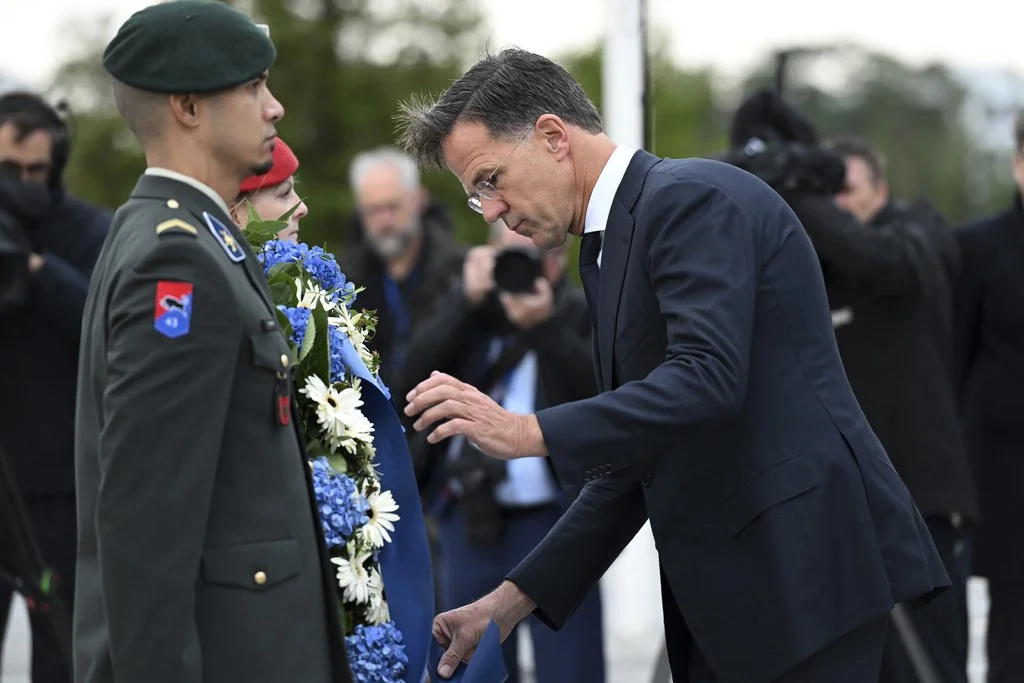Mark Rutte's First Week as Secretary General of NATO
Mark Rutte lays a wreath during his opening ceremony as Secretary General of NATO in Brussels, Belgium. Photo: AP Photo/Harry Nakos
Mark Rutte officially took office as Secretary General of NATO on Oct. 1, 2024, succeeding Jens Stoltenberg at the organization’s headquarters in Brussels. His appointment comes at a critical time for global politics, with heightened tensions surrounding the ongoing conflict in Ukraine, instability in the Middle East, and the uncertainty of the upcoming U.S. elections. As NATO faces considerable challenges in maintaining unity and effective defense strategies among its member states, the significance of Rutte's role cannot be overstated.
Rutte's political career spans over a decade, marked by his tenure as the Prime Minister of the Netherlands from 2010 to 2024. Known for his coalition-building skills, Rutte has navigated the complexities of Dutch politics, earning a reputation as a pragmatic and effective leader. His background in international relations, coupled with his experience in managing crises, positions him well to tackle the challenges that NATO faces today.
Mark Rutte and Jens Stoltenberg at the handover ceremony. Photo: AP Photo/Harry Nakos
From the outset, Rutte has prioritized the need for solidarity within NATO, underscoring the importance of strengthening defenses against potential threats. He recognizes that both increased military spending and collective defense initiatives among member states are crucial for maintaining the alliance's effectiveness. A key aspect of Rutte's vision is to modernize the European defense industry, which he views as outdated and overly dependent on U.S. arms. This is particularly pressing given the possibility of a Trump presidency, which could lead to a U.S. withdrawal from NATO and a cessation of arms support to Ukraine, leaving Europe to navigate its own security challenges. However, Rutte has previously collaborated with Trump and expressed support for his tough stance on China, and recognized his complaints regarding a lack of European defense spending.
In a strong show of support, Rutte's first official trip as NATO Secretary General was to Kyiv, marking his fifth visit since the Russian invasion of Ukraine, but his first in his new role. Rutte met with Ukrainian President Volodymyr Zelensky to reassure him of NATO's unwavering commitment. He emphasized that Ukraine is closer to NATO than ever before, a sentiment echoed by his dedication to working with Ukraine to improve weapons manufacturing capabilities through investment and innovation.
During his visit, Rutte made it clear that increasing industrial production would be a priority, stating, “NATO stands with Ukraine,” and reaffirmed the alliance's commitment to replenishing its own military stocks. Furthermore, Rutte confirmed that NATO membership for Ukraine remains a future goal, a significant statement given the current geopolitical landscape.
Looking ahead, Rutte's leadership is expected to significantly influence NATO's policies, especially regarding security concerns in Eastern Europe and beyond. Strengthening NATO’s eastern flank will be a critical focus, especially in light of the ongoing threat posed by Russia. Rutte’s approach will likely involve rallying member states around a unified response to these challenges, but he will undoubtedly face difficulties in harmonizing diverse national interests within the alliance.
As Rutte takes over his new role, the implications of his leadership will extend beyond military strategy. His ability to foster cooperation among NATO allies will be vital in addressing the multifaceted security dilemmas that lie ahead. With the challenges posed by an unpredictable geopolitical environment, Rutte's tenure at NATO could mark a turning point in the alliance's approach to collective security and defense. His first week as NATO Secretary General sets the stage for a leadership focused on unity, modernization, and steadfast support for Ukraine.


